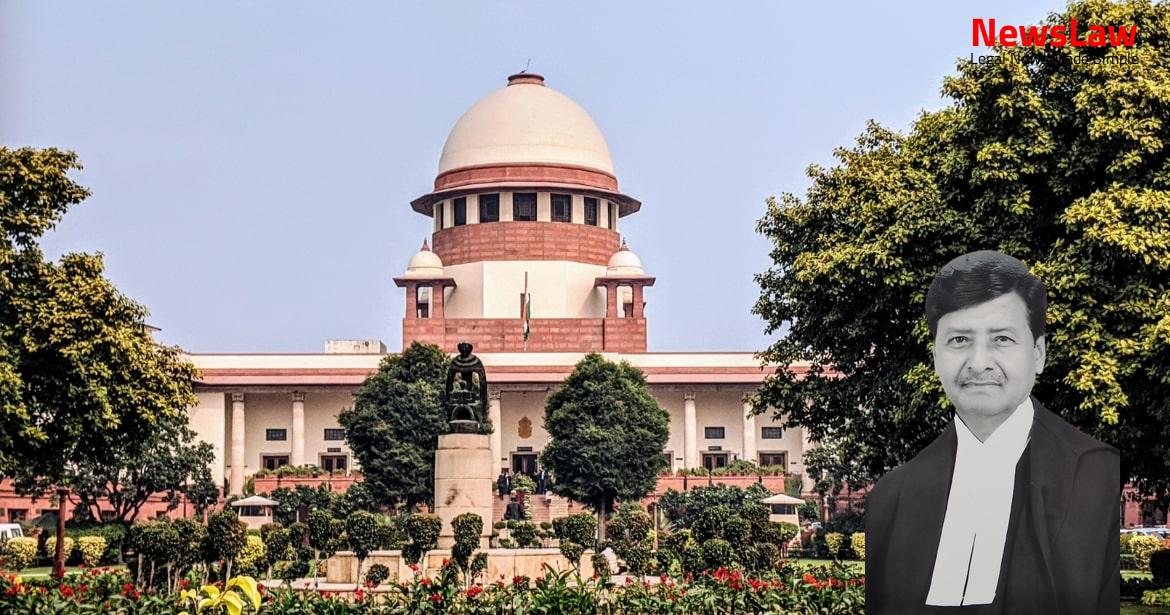Delve into the legal intricacies and meticulous analysis undertaken by the court regarding specific performance contract provisions in a recent case. The court’s in-depth examination of time stipulations, the essence of the contract, and the application of statutory amendments sheds light on the evolving landscape of contract law. Follow along to understand the complexities involved in determining the enforceability of specific performance based on contractual obligations and equitable principles.
Facts
- The appellant vendors failed to fulfill their duty under clause 3 of the contract.
- The purchaser suppressed material evidence by not disclosing the information about the failure of the agreement and registered GPA to materialize.
- The purchaser issued a cheque for Rs. 5,00,000/- which was dishonored, indicating a breach of payment obligations.
- The appellants acquired land through agreements dated 19.03.1994, 26.03.1997, and 27.03.1997 for various considerations.
- The suit property consists of 40.08 gts of land in Budvel Village, Rajendranagar Mandal, R.R. District with a total consideration of Rs. 40,20,000/-.
- The respondent initiated a suit for specific performance against the appellants Smt. Katta Sujatha Reddy and Smt. Kamireddy Geetha Reddy.
- Time was not considered the essence of the contract by both the trial Court and the High Court.
- The burden of proof regarding time being the essence of the contract falls on the party claiming so.
- The purchaser approached the Court with unclean hands, disqualifying him from benefiting from false claims made by the vendor.
- The purchaser sought permission to deposit the balance sale consideration, which was granted and finalized.
- The trial Court found that the purchaser was never put in possession of the property.
- Clause 3 of the contract specified a time limit for payment and other actions, but time was not treated as essential by the conduct of the parties.
- The trial Court concluded that specific performance was not warranted as time was not considered crucial to the contract.
- The High Court partially allowed the appeal, directing the vendors to register the property to the extent of the amount paid by the purchaser and refunding the deposited sum.
- Limitation issues were raised regarding the timing of the suit and recovery of the advance amount.
- The purchaser was deemed ready and willing to fulfill the contract obligations.
- The High Court highlighted the retrospective nature of certain legal provisions and the importance of considering changes in law during appeals.
Also Read: Assessment of Loss of Earning Capacity in Motor Accident Claim
Issue
- The trial court framed 5 issues for consideration related to specific performance of an agreement for sale of land.
- The High Court framed 7 issues for adjudication, including whether the suit is barred by limitation and whether the plaintiff proved possession over the property.
- The issues also included whether the plaintiff was ready and willing to perform their part of the contract, and whether they paid the balance sale consideration on time.
- A key point of contention was whether the time was considered the essence of the contract, and if the defendants could challenge this aspect without filing cross objections.
- An additional consideration was whether the purchaser could benefit from Section 12 of the Specific Relief Act due to partial payment made towards the contract.
- The part payment made in respect of the contract raised questions regarding the buyer’s entitlement to the relief of specific performance.
- The fundamental question raised was the nature of the amended Section 10 of the Specific Relief Act – whether it is prospective or retrospective in operation.
Also Read: Enhancement of Compensation in Workmen’s Compensation Act Case
Arguments
- The jurisdiction to grant specific performance of a contract is now mandatory as per the amendment to Section 10 of the Specific Relief Act.
- Courts are now required to grant specific performance unless the case falls under statutorily carved out exceptions.
- The respondent’s argument is that the purchaser did not approach the Court with clean hands.
Also Read: Determining Compensation in Motor Accident Claim Cases: Legal Analysis
Analysis
- The agreements to sell mandated completion of the contract by payment of the remaining consideration within three months.
- The High Court wrongly concluded that time was not the essence of the contract
- The suit filed by the purchaser was barred by limitation due to failure to adhere to the time stipulation under the contract.
- There was a breach of condition by the purchaser in failing to pay the balance sale consideration within the stipulated time.
- The 2018 Amendment to the Specific Relief Act is considered prospective and cannot be applied retrospectively in this case.
- The High Court erred in considering the 2018 Amendment as merely procedural; it had substantive principles.
- The nature of amendments determines whether they are procedural or substantive; the High Court misinterpreted them.
- The specific performance of contracts is now based on the Specific Relief Act’s requirements, not merely equitable principles.
- The High Court’s decision to grant specific performance was incorrect due to delay and laches on the part of the purchaser.
- The judgment found the purchaser’s statement regarding possession to be falsefor various reasons.
- Purchaser’s readiness and willingness to perform within the stipulated time was a crucial factor under Section 16 of the Specific Relief Act.
- When a party to a contract is unable to perform a part of the contract, they are considered the defaulting party to that extent.
- In a suit for specific performance, the other party must pay or have paid the agreed amount for the part of the contract capable of being performed by the defaulting party, and relinquish the claim for the part that the defaulting party cannot perform.
- The 2018 amendment to the Specific Relief Act is categorized as procedural and is considered to have retrospective effect by the High Court.
- The judgment and decree passed in a suit for pre-emption affirmed by the High Court would not be affected by such a section.
- The principle that time is not of the essence in contracts relating to immovable properties needs to be revisited due to changing circumstances like inflation and price increases.
- The courts should consider the prescribed time/period in contracts as having significance and not ignore it while granting specific performance.
- Greater scrutiny and strictness should be applied when determining if the purchaser was ‘ready and willing’ to perform their part of the contract.
- Every suit for specific performance should not be decreed solely based on being filed within the limitation period, ignoring the time-limits stipulated in the agreement.
- The power to order specific performance of a contract is discretionary and should not be exercised in cases where damages would fully compensate for the breach.
- A procedural amendment should be given retrospective effect.
- Section 12 of the Act does not apply when the inability to perform specific performance on part of the contract arises from the plaintiff’s own conduct.
- When a repeal of an enactment is followed by fresh legislation, the new legislation does not affect substantive rights unless made retrospective.
- There is no presumption that time is the essence of the contract in the sale of immovable property.
- An appeal court cannot consider a new law brought into existence after the judgment from being rendered.
- Courts of Equity in England started granting relief of specific performance when damages were found to be inadequate or equitable rights had been breached.
- The High Court’s reliance on certain cases was considered misplaced.
- Under Section 12 of the Specific Relief Act, 1963, the court generally does not direct the specific performance of a part of a contract.
- However, if a party is unable to perform a small part of the contract and compensation in money is possible for the deficiency, the court may direct the specific performance of that part.
- Section 55 of the Contract Act also addresses instances where a party is unable to perform the whole contract, especially when time is essential.
- If the unperformed part forms a significant portion of the contract but can be compensated in money, specific performance may not be granted.
- In some cases, the court may direct specific performance of a separable part of the contract that can and should be performed.
- The contract was breached due to the conduct of the plaintiff who did not perform the time-sensitive agreement
- The plaintiff only paid part of the consideration
- Relief under Section 12 of the Specific Relief Act is not appropriate due to delay, laches, and limitation
Decision
- Forfeiture clause present in the agreement
- Court decides to direct vendors to repay the amount with interest
- Interest rate set at 7.5% per annum
- Interest to be calculated from the date of payment by purchaser
- Vendors must repay the entire amount within six months
- Appeal allowed with vendors repaying amount and interest as specified
- Each party bears their own costs
Case Title: KATTA SUJATHA REDDY Vs. M/S SIDDAMSETTY INFRA PROJECTS PVT. LTD. (2022 INSC 865)
Case Number: C.A. No.-005822-005822 / 2022



